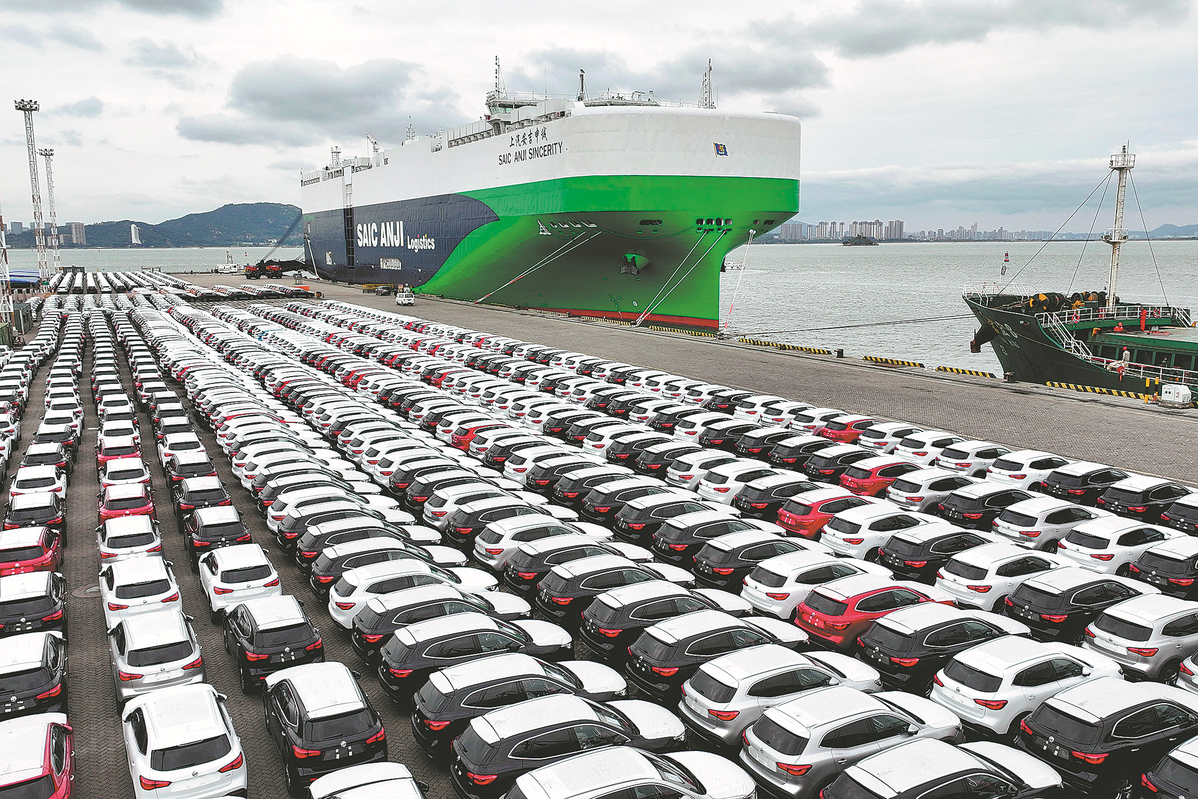
China-made new energy vehicles await shipment to Europe in Xiamen, Fujian province. [Photo/Xinhua]
This is an editorial from China Daily.
In a sign of the European Union resorting to rising protectionism, the 27-member bloc on Tuesday formally approved the imposition of hefty extra tariffs of up to 35 percent on imports of Chinese-made electric vehicles starting Wednesday, based on the results of a probe that the EU claims indicates Chinese government subsidies have unfairly undercut European automakers.
Chinese car giant Geely — one of the country's largest sellers of EVs — now faces an extra duty of 18.8 percent, while SAIC will be hit with the highest at 35.3 percent, on top of the current 10 percent on imports of EVs from China. Other EV producers in China including Western companies such as Volkswagen will be subject to duties of 20.7 percent, according to the final ruling of the European Commission. The tariffs will be definitive and last for five years.
Despite the EU trying to justify the protectionist move targeting Chinese auto companies by describing it as "fair market practices" aimed at safeguarding the European industrial base, it cannot change the fact that the so-called anti-subsidy probe did not comply with the World Trade Organization rules. Moreover, the levying of extra duties will inevitably disrupt the stability of the global auto manufacturing supply chains and harm the interests of European consumers.
Given that Chinese-made EVs, known for their advanced battery technology and energy efficiency, have played an irreplaceable role in Europe's green transportation revolution, the new curbs on them will erode their confidence in investing in the continent and severely slow down the global fight against climate change.
There has been strong opposition to the protectionist practice even within the trade bloc, with five countries including the group's biggest economy, Germany, voting against the tariffs and 12 abstaining. The extra tariffs are "a step backwards for free global trade and thus for prosperity, job preservation and growth in Europe", German Association of the Automotive Industry's president, Hildegard Mueller, said in response to the tariffs.
China has always sought to resolve its trade disputes with the EU, its second-largest trading partner, through dialogue and consultations, and has conducted more than 10 rounds of negotiations with the EU on its EV exports to Europe since the end of June, in the hope of avoiding the escalation of trade tensions, as it believes that would lead to a "lose-lose" situation for both sides. Some Chinese car producers have also offered to restrict their sales and raised prices to avoid tariffs.
It is therefore disappointing that the EU has ignored the efforts on the part of China to keep trade relations on the right track of healthy and stable development by going ahead with the "unreasonable" and "protectionist" practice.
The Ministry of Commerce has made it clear that China does not "agree with or accept" the tariffs, and has already filed a complaint under the WTO dispute settlement mechanism, with a ministry spokesman saying "China will take all necessary measures to firmly protect the legitimate rights and interests of Chinese companies".
A trade war between China and the EU is in the interests of neither side, and the best way ahead for them is to continue negotiations in pursuit of an alternative to tariffs even after the tariffs are in place. The EU, a long-time champion of free market and globalization, should exercise strategic autonomy by maintaining the mutually beneficial trade relations with China, rather than allowing itself to degenerate into a pawn in the US-orchestrated economic Cold War against the country to the detriment of the bloc's own economy.
Since the European side has said it will continue to consult with China on price commitments, and the technical teams of the two sides are conducting a new round of consultations, it is hoped that the EU will engage with the Chinese side in a constructive manner so as to reach a mutually acceptable solution that is pragmatic and balanced as soon as possible.

 中文
中文



